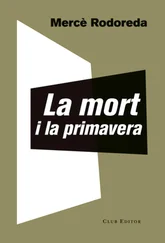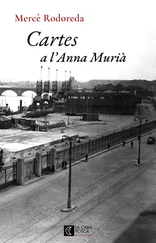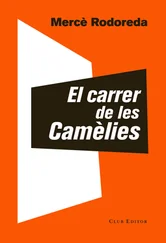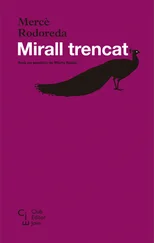XXIV THE MIRROR IN THE FOYER
SENYOR ARDÈVOL COULD NOT RECALL WHEN HE HAD STARTED going out at night. At first he had not ventured beyond the beach, though later he went as far as the village, at an hour when everyone was asleep. Three streets flowed into the church square, the middle one continuing on to the outskirts of the village. Past midnight on one of those many nights, he stopped in front of a window with a light on inside. Standing on a pile of stones, he spotted a girl undressing. He could not see her clearly because the window had curtains which, although sheer, clouded the view of the girl’s face. He liked that vaporous image. She probably had the broad face of a peasant girl, perhaps snub-nosed, healthy, with dreamy eyes, but he imagined a creamy blend of white and pink, eyes that offered a glimpse of the soul, trembling lips. . a girl who came to life against a backlight, so that he might contemplate her without really seeing her, and thus be free to reflect on her remembered image to the point of obsession.

Senyor Ardèvol returned from the trip with his friend Aran more anguished than ever and stayed indoors for several weeks. Until, little by little, he resumed his former routine.
It had all begun one night when the sea was in a swell of fury. He was in such a hurry to return home before the rain came that he started running and arrived at his kitchen door with his heart pounding. As he was stepping inside, a bolt of lightning fretted a thread across the sky. His heart still fatigued, he was making his way to the foyer to hang up his trench coat when he felt as though something were trying to stop him. He could not make sense of it, but it seemed that his legs would not respond and that his heart, so agitated only a moment before, had stopped for the space of a few seconds. It wasn’t exactly that; it was more as though a mysterious force were emptying him of his “I.” That was all. When he finally found himself in the parlor, he downed half a bottle of cognac and, although it was late, he read for a while. He chose a book at random and opened it to the beginning of a page that argued, roughly, that man is the master of his actions, free to desire or not to desire, by the power of his thinking and the virtue of his reason; imagination, it said, turns perilous when we ponder the act of becoming and the conditions that govern it. As I read Senyor Ardèvol’s account of the book, I could not quite grasp the meaning of this. The book stated, and I read it many times over so I would remember it. . or, rather, it didn’t so much state as pose the question: Under what conditions can one become another?
On the night following the events just described it was bitterly cold outside and he had to bundle up. He left the house through the kitchen door, leaving it unlocked. The fields were covered in frost. He sat on a rock facing the sea. Senyor Ardèvol explained that he had never had a meditative disposition, but that he was a contemplative man. Enamored of the mystery of life, he had never felt the need, as his friend Aran had, of attempting to decipher it. He considered it an unassailable mystery. And a mystery must struggle — that is its principal reason for being — so that its great beauty will not be stripped from it. The sea resembled a lake that night. Small waves died on the sand, flat, with a litany of sighs. Suddenly the girl in the window came to mind, a faraway thought lost in time. Why had his interest waned, when so many times before she had been the enticement to go into the village? And he began to think of death. Senyor Ardèvol wrote that when people die they should remain frozen in that moment, like those human shapes that have been perfectly preserved in a vacuum and turn to dust with the slightest puff of air. They should die with their senses fully alive, in the middle of the street while strolling through a sleepy village.
The moon deposited slivers of light on his balcony window. Smudges of brightness that elongated and widened in a dance, phantoms of stripes, shiny blocks, darkened spaces. When he returned, he stopped in the foyer and, while hanging up his coat, was overcome by a powerful urgency to turn around. In front of him hung the mirror. Senyor Ardèvol described it. Beveled. Mottled. A mahogany frame with a garland of flowers and leaves. He had never felt the need to look at himself in the mirror, other than when he shaved or was at the tailor’s trying something on. But that night he looked at himself for a while, as if bewitched, not by his own image but by something within the mirror. His features, he wrote, were not harmonious: his brow too high, his cheeks too sunken, his eyes too small. In the mirror, slightly to the right, appeared a pair of eyes with a disquieting fixity, like those of the cat in the square. Only larger, closer together, the whites of the eye more generous. Questioning eyes. He felt — and the thought anguished him more than anything else — that those were his own eyes, though they were not. Those eyes wanted to convey things he could not understand. With great effort, for the fascination was intense, he looked away and, when his eyes returned to the mirror, there was nothing there. Only, as always, part of the coat rack, the lightbulb that cast a yellow gleam, and his own image. He went to the living room and lit a fire; he needed the company of the flames. He was prepared to read until he fell asleep, so as not to think. But he found he could not read a line. An understandable curiosity compelled him to return to the foyer. The mirror was in its usual place, with its mottled specks and flowers. He tapped the lightbulb to see if the pendular movement would summon a reflection into the mirror. He wanted to see those eyes again.

While he was having dinner he vaguely pondered the last page he had read. To receive in oneself the other’s form without his substance . Later, as he sat facing the sea, he was again consumed by anguish. He soon rose and made his way back, stopping for a while to observe the house from the low wall. He entered and immediately approached the mirror and planted himself squarely before it. After waiting for a few minutes that seemed interminable, he began to perceive those eyes. They came forth slowly, questioning and sad, not on the right side of the mirror as they had the first time, but centered on his own eyes, those eyes that should have been his but were another’s. A smudge, milky at first, then slowly becoming clearer, began to acquire the contours of a shape which he soon recognized as an arm covered with chain mail, at the end of which was a hand with long fingers like his own, the palm open, a wound in the center. Some letters began to form to the side of the arm: Stigmata. He turned his back to the mirror. When he wanted to turn around again, he found that he could not. Until the bell tower in the village struck one o’clock. He then looked in the mirror and found the usual mollifying objects: part of the coat rack, the lightbulb, and himself. Stigmata. Where had that word come from? He had never used it. In his adolescence there had been that knife wound on Baixeres’s hand. . He looked up the meaning of the word. Stigmata: Mark or brand, particularly one made with a hot iron as a sign of infamy or, possibly, slavery. Senyor Ardèvol wrote that a saint — Augustine — had helped him take his mind off the mirror. “I had sunk far away from Thine eyes. In Thine eyes, there was nothing more repugnant than I.”

He looked out onto the garden from the railing at the kitchen window. The moon was golden. He had chosen a book from the library, which he now started to read while making himself a pot of coffee. One of the characters in the book — he couldn’t recall which — had said that those who allow their souls to be populated by terror see things that do not exist. Senyor Ardèvol wrote that he had laughed so hard he had almost choked. He had allowed himself to be frightened by the mottled mirror and by those eyes as he might have been by a lion or giraffe-shaped cloud munching on the blueness of the sky. With the book under his arm and the coffee pot filled to the brim, he marched up to the mirror and stood before it, defiant. His own true self and nothing other than that was what he saw in the mirror, and poorly reflected at that: the right side on the left, the left on the right. He had bid farewell forever to those eyes, to whatever he had been able to glimpse in that mirror. He went upstairs feeling as though he had just been released from prison after years of confinement. He took another book, an essay about Saint Thomas. The human soul begins. . I can’t recall everything Senyor Ardèvol wrote. . through the door. . the embryo. . The father does not create the soul. . reading those papers, written in a handwriting that, more than read, had to be deciphered, it took me some time to understand that the embryo is the beginning of a person. The father creates the bones and the blood, the body. A soul desiring to live again in this world awaits the infant’s first cry, then slips inside him. . It wasn’t altogether clear whether the soul entered at the child’s first cry or when the child was still surrounded by water. . Senyor Ardèvol put down the book and walked to the balcony. The moon glowed golden. Old preoccupations stirred within him: the wound on Baixeres’s hand, the dream in which he had been stabbed with a dagger with a five-hole blade so the wound would stay open. It had been a while since the church bell had chimed midnight, that time of day when the hidden sun slows the flow of blood and turns sleeping men into creatures that invite death. Suddenly, as though ejected from his chair, he sprang up and headed to the foyer. He dragged one of the stools before the mirror and sat down. Motionless. He gazed into the mirror with a steady heart and not a trace of fear, and saw appearing within it those eyes that looked at him and he at them. And that night the face took shape. The face of someone who had suffered greatly. The lips were full, those of someone who had reaped life’s pleasures. Despite the mouth, the face conveyed a deep asceticism that is only attained over the course of an intensely-lived existence. On the bottom edge of the mirror something gleamed that he could not quite recognize. . Here the writing ended.
Читать дальше













